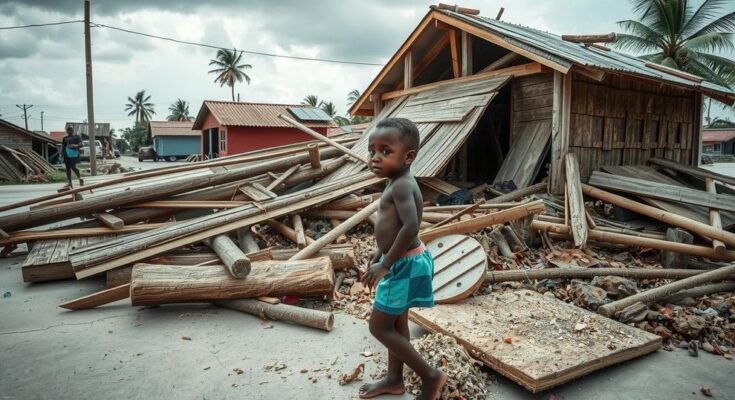Cyclone Chido has severely impacted Cabo Delgado in Mozambique, causing over 35,000 homes to be damaged and affecting more than 90,000 children. The disaster led to the destruction of educational and health facilities while escalating public health risks amid a cholera outbreak. With millions facing food insecurity, urgent humanitarian assistance is required, and UNICEF has called for $10 million to support recovery efforts amidst ongoing crises in the region.
Cyclone Chido has wreaked havoc in Cabo Delgado province of Mozambique, leaving over 35,000 homes either damaged or destroyed and impacting more than 90,000 children. The storm, which made landfall on December 15, 2024, also resulted in the destruction of 186 classrooms and 20 health facilities. Mary Louise Eagleton, UNICEF’s Representative in Mozambique, stated that the country has been severely affected by climate change, compounding existing crises such as conflict and drought. Despite these challenges, UNICEF and its partners are mobilizing resources for rapid humanitarian response.
The cyclone struck near Pemba, causing widespread damage to civilian infrastructure, including electrical grids and communication systems. This region is no stranger to adversity; it has experienced over seven years of conflict, displacing approximately 1.3 million individuals, predominantly women and children. In addition to Cabo Delgado, Nampula and Niassa provinces have also been affected, resulting in over 25,000 families losing access to electricity and two water facilities sustaining damage.
Health concerns are escalating as Mozambique battles a cholera outbreak. The cyclone’s destruction is likely to exacerbate the crisis, potentially leading to increased disease transmission in vulnerable communities. Projections indicate nearly 3.3 million people in Mozambique are expected to face crisis-level food insecurity next year, largely driven by the effects of El Niño, while La Niña patterns threaten further deterioration in 2025. Currently, approximately 4.8 million individuals, including 3.4 million children, require urgent humanitarian assistance.
Mozambique has been heavily impacted by climate change, making it one of the most vulnerable countries in the world. The region is grappling with a multitude of challenges, including ongoing conflict, severe droughts, and disease outbreaks, which threaten the lives and well-being of millions. Cyclone Chido adds to this precarious situation, as it has further destabilized an already vulnerable population. The increasing frequency of climate-related disasters, such as Cyclone Freddy in 2023, highlights the urgent need for sustained humanitarian support and effective disaster management strategies. Cabo Delgado province has suffered immensely due to armed conflict over the past several years, resulting in significant internal displacement and increased numbers of affected children. The compounded crises challenge local and international agencies, including UNICEF, to respond effectively. The humanitarian repercussions of Cyclone Chido exemplify the necessity for comprehensive approaches to deal with the multifaceted impacts of climate change and ongoing conflicts in Mozambique.
In conclusion, Cyclone Chido has profoundly impacted Mozambique, affecting thousands of homes and children while exacerbating ongoing crises in the region. The combined effects of climate change, armed conflict, and health outbreaks necessitate urgent humanitarian interventions. UNICEF is prioritizing swift actions to alleviate the suffering caused by this disaster, calling for substantial financial assistance to support recovery efforts. The urgent nature of this response emphasizes the critical role of international support in mitigating the impacts of such disasters in the future.
Original Source: reliefweb.int




